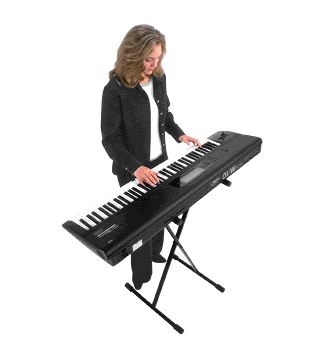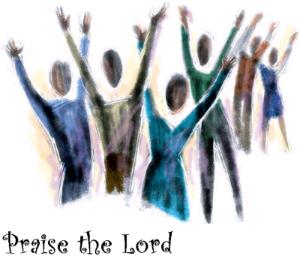What is worship anyway?
Attempts to legislate for and define the things of the heart is an issue that has caused problems in the early church; and it would seem that today things are not much different. So what is true worship?
First published: 15/03/2011
 TRUE WORSHIP cannot be manufactured; neither can it be controlled. It is of the heart, and not of the mind or of the flesh. Worship is a free spirit which breaks out in a variety of ways, in a whole range of different circumstances and as a result of a diversity of promptings. TRUE WORSHIP cannot be manufactured; neither can it be controlled. It is of the heart, and not of the mind or of the flesh. Worship is a free spirit which breaks out in a variety of ways, in a whole range of different circumstances and as a result of a diversity of promptings.
Worship can be silent; or it can result in sung and/or spoken praise. Worship can expressed in prayer; with eyes open or closed. Worship can be expressed through physical expression in movement and posture. Worship can take place in solitude or in multitudes. Worship transcends and defies tradition; and when true worship breaks out is no respecter of form or protocol.
At one level, worship – as an affair of the heart – is incapable of being contained. However worship is also a fragile flower which can bloom spontaneously yet be crushed by insensitivity. The spirit of worship can arrive without notice, and depart silently without warning.
And yet men have sought to define it and contain it: to legislate for its expression and the circumstances in which it is appropriate and expressed. To ever do so is a folly; and yet the folly persists.
A short story: but a true story
 ONCE upon a time there was a church in which God’s people were accompanied in sung praise by a pianist. Let’s call her Mary. ONCE upon a time there was a church in which God’s people were accompanied in sung praise by a pianist. Let’s call her Mary.
Mary was a very private person, and whilst her playing was always note-perfect, she was very self-conscious. Being ‘in the public eye’ perhaps rendered her playing as being rather ‘mechanical’. Her natural reserve also prevented her from being comfortable in praying openly with others. So no one heard the spirit in her heart.
Within the same church there was also an elderly man who had a ministry of prayer over many years: he was in daily intercession for the needs of the congregation and those beyond. We’ll call him Peter. He travailed in prayer.
On the occasion of one mid-week prayer gathering, the church elder leading the meeting (we'll say his name was John) thought to depart somewhat from the standard routine. He explained to those present on that fine summer’s evening that he would not close the meeting at 9.00pm as was the custom, but – while recognising that some might have to leave at that time for valid reasons – folk were free to stay on beyond that time if they felt so to do.
It was in this context and shortly after the meeting started that those present in the church hall – including Peter and Mary, who had been leading the singing with the piano - got down to prayer.
By the time 9 o'clock came around, many prayers had been offered to God; but John kept his head down and his eyes closed, and the meeting continued. A few more people prayed, but then a period of silence was broken by the sound of a chair being pushed back on the hardwood flooring. Someone got up to leave. Minutes later more chairs scraped, as a succession of people exited the room. They left the room as quietly as possible, but the recurring sound of the door opening and closing caused John to wonder whether he would ultimately find himself alone.
Indeed after about fifteen minutes silence fell again and he couldn’t then discern whether or not anyone else remained. He rested however in the quiet of the situation.
But then a voice spoke out in renewed prayer: it was Peter. “What a man of faith,” thought John. “Thank God for him.” Following Peter’s prayer there was another time of silence – perhaps five or ten minutes elapsed. Then the silence was broken again. But now it was not a human voice that filled the room, but a stream of notes from the piano.
Holy Spirit-inspired 'liquid' praise
 For a considerable time the sound that came from the instrument was the most beautiful flow of ‘liquid praise’ that John had ever heard. If ever a piano was able to exalt God with such inspired eloquence, sensitivity and love then it happened that night. For a considerable time the sound that came from the instrument was the most beautiful flow of ‘liquid praise’ that John had ever heard. If ever a piano was able to exalt God with such inspired eloquence, sensitivity and love then it happened that night.
And it was Mary, quiet Mary, who poured her heart out to her God through her playing in a way that John had never heard before. In truth he has never heard anything quite the same since. She prayed and praised from her heart through her finger-tips. She played like she had never been heard to play before. From the heart through the finger-tips through the air and to God.
Moreover it happened mid-week. Not a Sunday; not in ‘the sanctuary’; neither at a stipulated ‘holy hour’ nor sandwiched between a ‘call to worship’ and a closing benediction; nor with a clergyman present to monitor the scene.
It is possible – probable even – that Mary had never heard of the Westminster Confession of Faith; or if she had, pondered for a single moment whether or not she was transgressing its formula for ‘worship’. But worship is what she did. And if ever there was a sound that expressed the deepest love for God then it happened that night.
Men may continue to debate about what is and isn’t ‘worship’; and what is and isn’t allowed. But some things are too holy for the hand of mere men (2 Sam 6:6-7). And these things will never come close to what constitutes true worship – that overflow of a human heart to a great, majestic God who first poured out His love for us.
That is worship; true worship.
Compare and contrast: WCF XXI.
|